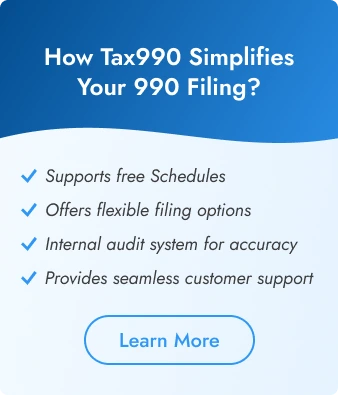What Should Supplemental Unemployment Benefit Trusts Know About Tax Exemption and Form 990 Filing?
- Updated August 14, 2023 - 2.00 PM - Admin, Tax990
Any nonprofit organization must be aware of the criteria for obtaining tax exemption and requirements for staying tax compliant with the IRS, no matter what’s the type and operational purpose.
This article elaborates on the criteria for Supplemental Unemployment Benefit Trusts to obtain tax exemption and what are the requirements to file 990 forms are.
Table of Contents
How Does the IRS Define Supplemental Unemployment
Benefit Trusts?
Per the IRC Section 501(c)(17), Supplemental Unemployment Benefit Trusts are:
Organizations formed as part of a written plan (created and maintained by an employer, employers, or both) solely for the purposes of providing the payment of supplemental unemployment
compensation benefits.
- These benefits are paid to an employee due to the employee’s involuntary separation from employment as a result of a reduction in force, the discontinuance of a plant or operation, or any similar conditions.
- The plan may also include sick and accident benefits, if these are subordinate to unemployment compensation benefits
How Can the Supplemental Unemployment Benefit Trusts Apply for Tax Exemption?
Supplemental Unemployment Benefit Trusts seeking tax exemption are required to submit an application to the IRS by filing Form 1024 - Application for Recognition of Exemption Under Section 501(a) or Section 521 of the Internal Revenue Code (IRC).
Additionally, they will need to meet the requirements below in order to be/stay eligible for exemption:
Must be a valid trust under local law, be evidenced by a written document, and be part of a
written plan.
Should ensure that the trust’s corpus and income are not used for any purposes other than providing benefits to the satisfaction of all liabilities of the employees covered by the plan.
Should be determined as per the objective standards and may not be determined solely in the discretion of the trustees.
The eligibility criteria and the benefits payable shouldn’t discriminate in favor of officers, shareholders, supervisory employees, or highly compensated employees.
What are the 990 filing Requirements for the Supplemental Unemployment Benefit Trusts?
Obtaining tax-exempt status doesn’t mean that the Supplemental Unemployment Benefit Trusts aren’t required to complete annual tax filing. They must file 990 Series Forms every year and report the details
required by the IRS.
Here are the different types of 990 forms available,
Supplemental Unemployment Benefit Trusts should e-file form 990-N if the gross receipts of
$50,000 or less.
Supplemental Unemployment Benefit Trusts should e-file Form 990-EZ if they have gross receipts less than $200,000 and assets less than $500,000.
Supplemental Unemployment Benefit Trusts should e-file Form 990 if they have gross receipts of $200,000 or more (or) assets of $500,000 or more.
Additional Filing Requirements
Supplemental Unemployment Benefit Trusts that file Form 990 or 990-EZ may need to attach certain 990 Schedules for reporting additional details.
Also, if their unrelated business income is $1000 or more, they must file Form 990-T electronically.
When is the Form 990 Deadline for the Supplemental Unemployment Benefit Trusts?
The 990 forms are due by the 15th day of the 5th month after the end of the accounting period, followed by the Supplemental Unemployment Benefit Trusts.
The deadline for filing 990 series is May 15th when the organization follows the calendar tax year.
Operating on a Fiscal Tax Year? Find your 990 due date.
If this deadline falls on a weekend or a holiday, the trusts must file their 990 returns by the next business day.
Tax990 Offers Simple and Secure Form 990 Filing for Supplemental Unemployment Benefit Trusts!
The Supplemental Unemployment Benefit Trusts and all the other tax-exempt organizations can make their 990 filings extremely easier and effortless with Tax 990.
The IRS-authorized e-file provider offers the following helpful features to simplify the filing process,
Includes Schedules - Our system makes sure to include the applicable 990 Schedules automatically
for free.
Flexible filing options - Tax990 offers two different filing methods - Form-based and Interview-style filing to simplify form preparation.
Internal audit check - Error checks are built-in to perform audits on completed returns and
ensure accuracy.
Free Retransmission - In case the IRS rejects the 990 returns, our system allows retransmission of those returns after the errors are fixed.
Dedicated Customer Support - We have a team of experts to address any questions instantly via live chat, phone, and email.


